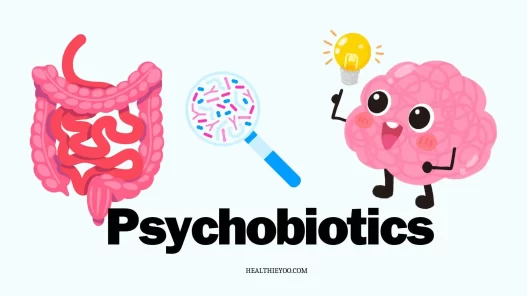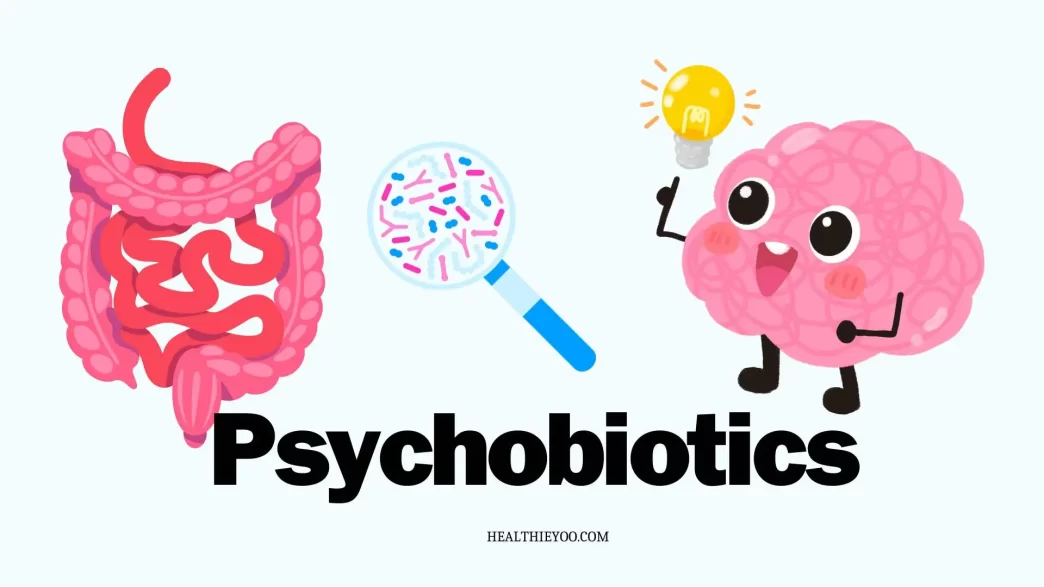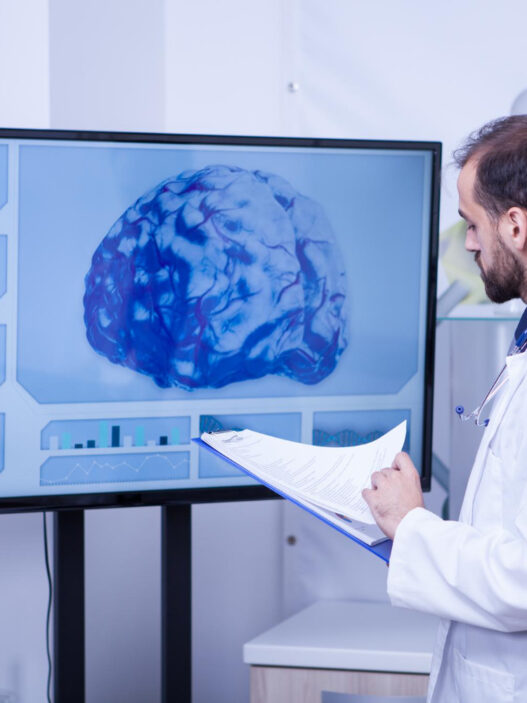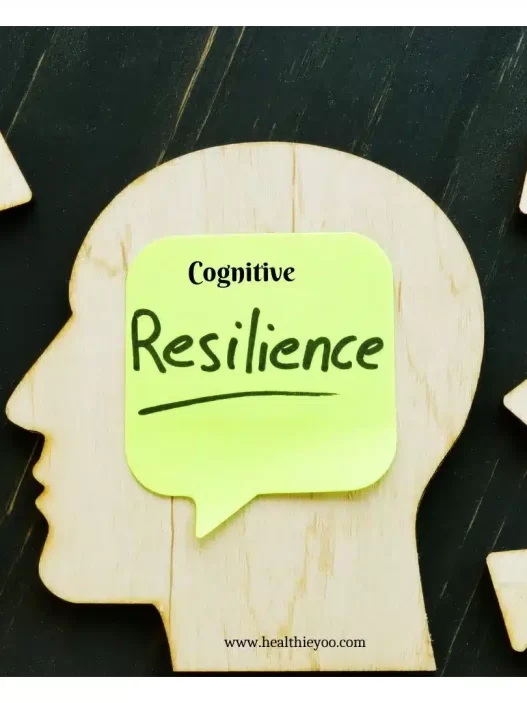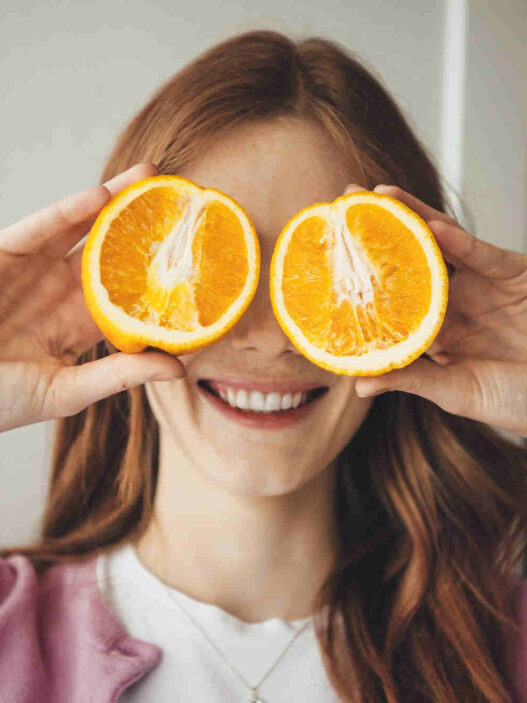What are psychobiotics? What are psychobiotic foods and psychobiotic supplements? How they help improve mental health. Gain from a better-balanced microbiome. Also check out the Nova classification of processed foods and their health risks.
What are Psychobiotics?
Psychobiotics refer to a group of probiotics made up of live microorganisms including bacteria, fungi, and viruses which can help to improve mental health. They live and function in the gut and have a direct effect on the brain as they have bidirectional communication between the gut and the brain.
Neurotransmitters pass signals from the brain through the Vagus nerve to the gut and back, regulating mood, stress, and anxiety. This connection between the gut and brain is often known as the “second brain”.
When people develop symptoms of anxiety or depression, it’s likely that they are producing insufficient levels of serotonin and dopamine. Both of these chemicals help to control mood, sleep, digestion, emotions, cognitive performance, and memory.
It’s known that over 90% of serotonin is produced in the gut and 50% of dopamine is also produced in the gut. So, when people develop mental health issues, it’s likely that they are producing insufficient amounts of serotonin and dopamine in the gut.
The reason for a lack of production of these chemicals is usually due to inflammation in the gut and the brain. This can often be due to eating a diet high in processed foods leading to an imbalanced microbiome.
Understanding Processed Foods and their Health Risks
Processed foods are foods that contain chemicals or compounds that have been altered and can cause damage to the gut microbiome. These can include preservatives, monosodium glutamate, food colorings, grilling bi-products, curing bi-products, or any other processing-related compounds.
Foods that include the above additives include ready meals, pizzas, sausages, bacon, burgers, carbonated drinks, alcohol, pies, instant noodles, sweets, take-away meals, some breakfast cereals, ice cream, biscuits, and any other food that has been processed in any way.
These processed foods have significant health risks. In the next section, we will see how we counterbalance these risks using psychobiotic foods and/or psychobiotic supplements. However, first let us understand below how we identify processed foods and the Nova classification of processed foods.
NOVA CLASSIFICATION OF PROCESSED FOODS

As per NOVA classification, processed foods can be categorised into following 4 groups:
Unprocessed or Minimally Processed Foods
This includes edible food parts of plants, animals, fungi, water. No additives are included in this group of foods.
Examples: Fresh fruits and vegetables, grains, meat, eggs, milk, yogurt, spices, etc.
Processed Culinary Ingredients
If you process the above foods by grinding, refining, drying, etc. to obtain ingredients used for cooking above foods or adding seasoning, etc. However, no additives are added.
Examples: Olive oil, Salt, Sugar, Vinegar, Honey, Butter etc.
Processed Foods
Once you add culinary ingredients to unprocessed foods and preserve these foods through baking, boiling, canning etc and use fermentation which is non-alcoholic, and add additives to increase their shelf-life or prevent contamination, then these are processed foods.
Examples: Cheese, Canned veggies, Nuts, Dried Fish, Breads, Cakes, Biscuits, etc.
Ultra Processed Foods
Foods that mix several ingredients in much higher amount as compared to processed foods including salts, sugar, oils, fats and even include those with no culinary value such as high-fructose corn syrup, fruit juice concentrate, hydrogenated oils, protein isolates, gluten, whey protein, modified starches, etc. are ultra processed foods. Here the natural food is very less and so many artificial colours, flavours, non-sugar sweeteners, maltodextrin, fructose, dextrose, lactose, thickeners, emulsifiers, etc are added.
“Sugar and fat don’t occur together in nature. Food scientists combine them in processed foods, which override our systems and make us crave more.”
When imbalances of the gut occur, this can lead to increased inflammation which disrupts the good bacteria and increases the risk of producing bad bacteria and toxins which can cause tight junctions in the gut to open up in the gut to allow harmful bacteria and toxins to enter the bloodstream.
This can lead to a number of disease processes including diabetes, depression, inflammatory bowel disease, and other auto-immune diseases as well as mental health disorders. The chemicals/ additives used in Ultra processed foods have even been linked to various types of cancers.
What can you do to counterbalance these effects?
Research has shown that one of the Psychobiotics, called Bifidobacterium longum, in particular, has a positive effect on both the brain and gut by helping to reduce the inflammatory processes in the brain and gut.
This Psychobiotic helps to remove inflammation from the gut and brain. It may also influence the body’s response to stress and anxiety by helping to regulate the production of stress hormones such as cortisol.
Once levels of inflammation fall, the brain and gut are able to function more normally allowing the transport of serotonin and dopamine to occur more efficiently through the immune system and neurotransmitters.
This allows the brain to help remove unwanted symptoms of anxiety, depression, and other symptoms related to mental health such as lack of sleep, poor memory, and poor concentration.
How to choose a Psychobiotic Food and Supplement?
What are Psychobiotic Supplements?
When choosing a Psychobiotic, it’s important to choose one that contains the most beneficial blend of strains. Psychobiotic supplements are generally strains containing Lactobacillus and/or Bifidobacterium.
It’s also important to choose a supplement that has been tested for purity and quality. Some of these psychobiotic supplements come in powdered form which means that they can be sprinkled easily onto foods such as soups, smoothies, or cereals. Powdered supplements are often the best way to take psychobiotics as they are colonized more easily in the gut when consumed.
However, it’s not just Psychobiotic supplements that help to improve mental health. The psychobiotic foods or diet also plays a large part in keeping our gut and brain healthy.
What are Psychobiotic Foods?
Psychobiotic foods are those that contain Psychobiotics that could help to improve gut-brain health. These psychobiotic foods contain probiotics which can help to improve digestion, improve immunity, and decrease the risk of diseases such as Lupus, heart disease, Alzheimer’s disease, diabetes, and mental health illness.
In 2019, a research study showed that high numbers of people who ate probiotic foods had overall lower rates of anxiety and depression.
Types of psychobiotic foods that contain probiotics include fermented foods such as yogurt, sauerkraut, kefir, miso, kimchi, and pickled vegetables. They work by improving the levels of good microbes in the gut which, in turn, help to improve immunity, digestion, and a reduction in disease processes.

By reducing inflammation, these psychobiotic foods help to influence the body’s response to stress by regulating the production of stress hormones. This can be particularly helpful for people who may be suffering from anxiety or other stress-related symptoms helping to reduce the risk of severe mental health problems which can often be associated with inflammation.
In addition to the above foods, it can also be very beneficial to add flax seeds and chia seeds to the diet as they are also known to reduce inflammation in the gut. They are full of Omega 3 which is crucial to helping to fight inflammation in the gut.
As with Psychobiotic foods, these can be sprinkled on foods such as smoothies, cereals, stews, or, in fact, any other foods.
What do I gain from a better-balanced microbiome?
When the gut is healthy and inflammatory levels are low, certain types of bacteria in the gut will help to create healthy cells which turn off the inflammatory T cells that are responsible for inflammation and disease. The immune system stops attacking itself and the microbiome becomes more balanced which allows the gut to heal and function more effectively by reversing the negative effect of antibodies.
Once inflammation is under control, the body can repair itself more easily. Not only can stress and anxiety be improved but other inflammatory and auto-immune conditions such as Irritable Bowel Disease, arthritis, and rheumatism can be contained.
Eating the right diet and psychobiotic foods or supplements is the key to a healthy gut and brain. When the body has the right nutrients to keep healthy the immune system will work effectively. Disease processes will be reduced, symptoms such as brain fog and poor concentration will be removed, sleep will improve and energy levels will increase.
However, a word of caution.
It is advisable to speak to a health expert if you plan to take Psychobiotics. There is no regulation of psychobiotic supplements so it is possible, as with all foods and supplements, that they could potentially pose an allergy risk or could interfere with current prescribed medications.
While there is a lot of evidence demonstrating the effectiveness of psychobiotic supplements and psychobiotic foods, it may also be necessary to have additional treatments from a qualified doctor. So always make sure you speak with your doctor before taking Psychobiotic foods and supplements if you are already taking prescribed medications.
Is there anything else I can do?
Other factors that may impinge on poor mental health can include environmental triggers. These can be associated with illnesses caused by pandemics, smoking, food poisoning, viruses, and diseases such as malaria, yellow fever, and other travel-related diseases.
These factors can often be exacerbated through issues such as poor diet, nutrition, and stress.
Stress itself, as already mentioned, can cause inflammation by increasing inflammatory markers in the bloodstream. People with high levels of stress can end up being at high risk of developing autoimmune diseases. Without good nutrition, the body is unable to repair cells that have been damaged as the immune system is unable to fight inflammation and infection efficiently.
Apart from eating a healthy diet and taking Psychobiotics foods and supplements, there are also other small steps that can be taken to help maintain good health. These include at least 6 hours of unbroken sleep each night, getting at least 10 minutes of meaningful physical activity daily, ensuring that work is not taking over life, communication with friends and family on a daily basis, taking holidays or breaks away from work, having a hobby that is enjoyable and employing relaxation techniques such as meditation and deep breathing exercises.
One of the best therapies for helping to reduce the chances of developing inflammation in the body is laughter. It decreases stress hormones and helps to increase the number of immune cells in the body as it swaps the cortisol produced during stressful incidents and replaces it with the production of endorphins and dopamine.
Further, it helps to decrease the heart rate and blood pressure and relax muscles. This all helps to create a feeling of happiness and relaxation which helps to improve the immune system which helps to improve signals between the brain and gut to improve mood and remove feelings of anxiety and depression.
Ways to increase laughter can be to watch comedies, talk with friends and family, listen to comedians or tell funny stories.
Another way to relax is to practice deep breathing exercises. Doing box breathing is a great way to learn to relax. You breathe in through the mouth for 4 seconds, hold your breath for 4 seconds, then breathe out through your mouth slowly for 4 seconds and hold your breath again for 4 seconds. If you do this for about 12 minutes daily and continue this regime for about 12 weeks it helps to stimulate the parasympathetic nervous system which is responsible for calming the nervous system.
It also helps to lower blood pressure and reduces the level of stress hormones in the body. The lungs receive higher levels of oxygen which, in turn, helps the brain to increase levels of oxygen.
It’s a great way to distract your mind from the day-to-day stresses and in the long term, it allows the immune system to improve and inflammation in the gut and brain to be reduced.
The Final Words
Incorporating a healthy diet, taking Psychobiotics – whether psychobiotic foods or psychobiotic supplements (with caution), having a good night’s sleep, meaningful exercise, deep breathing, laughter, and having a supportive family and friends can help to keep inflammation and infection away from the brain and body.
If you can learn to implement all these strategies life will be an enjoyable and worthwhile experience. Enjoy!!

Charlotte, BSc (Psychology), RGN is a Gut Health Expert and a Nutritional Therapist based in Radstock, UK. She is a qualified Advanced Gut Health Nutritional Advisor, NLP Master Practitioner and Registered Nurse. She helps busy senior professional women learn how to manage their digestive distress to transform their health and elevate their work performance. She has been helping women to navigate their gut and menopausal health issues for over 2 years now and is providing successful outcomes for women.
